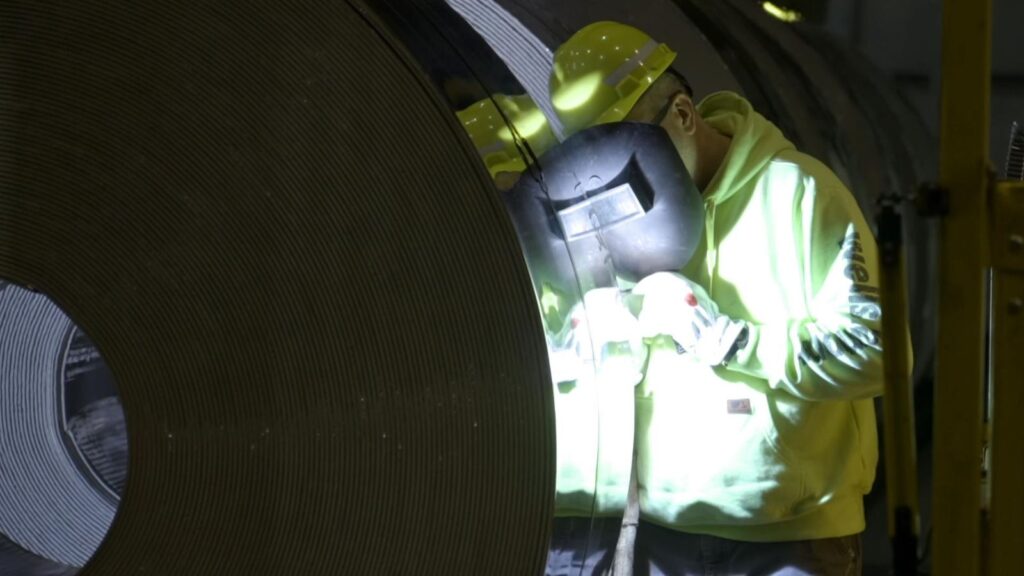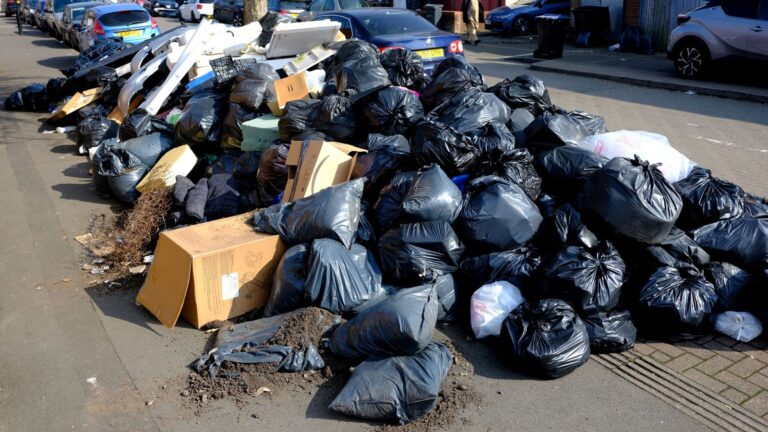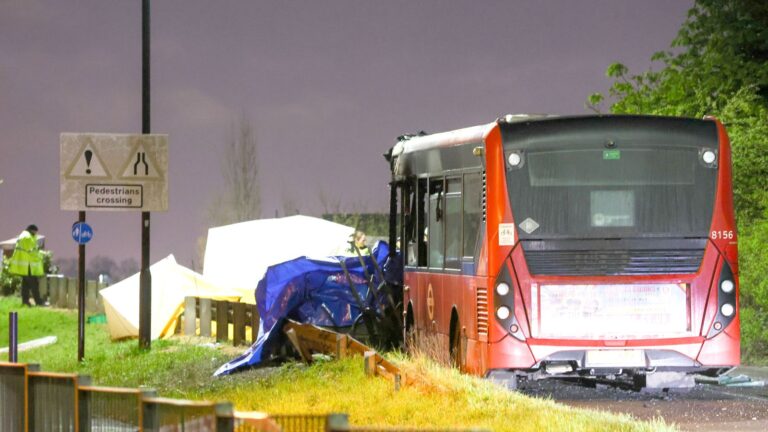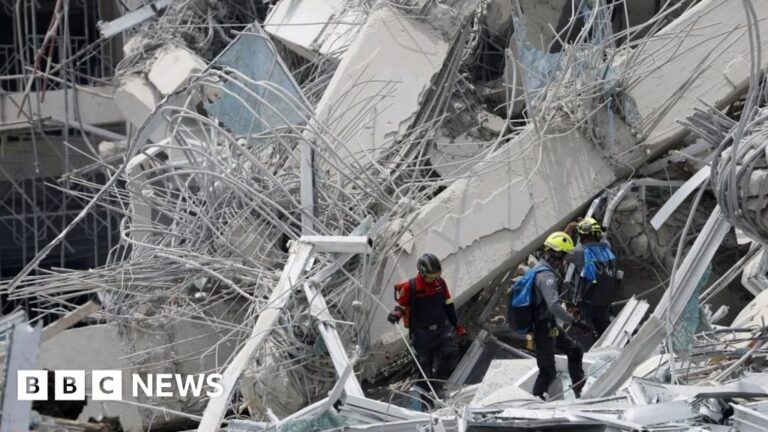

On the banks of the Ohio River in a rural corner of one of America’s poorest states sit two factories, one next to the other.
One is open. The other is shuttered. Both cut to the heart of what Donald Trump hopes he can do to transform America’s industrial base.
Ravenswood, West Virginia, is a town built on aluminium. Since the 1950s, the wonder-metal has kept this place on the map.
Once upon a time, the metal itself was produced here. A massive smelting plant dominated the skyline, and inside, huge furnaces, transforming American aluminium ore (alumina) into the metal we recognise.
The newly smelted metal was then sent by river, rail and road to other factories dotted across the country to be cast – turned to sheet and coil for the nation’s cars, planes, trucks and so much more.
 Image: The Kaiser Aluminium plant closed its smelters in 2009
Image: The Kaiser Aluminium plant closed its smelters in 2009
Kaiser Aluminium closed its smelters in 2009. The plant now sits idle. Fencing surrounds it; grass partially obscures the entrance, where hundreds of workers would once have passed.
Two hundred metres down the road, there is a different story.
Constellium Ravenswood is one of the world’s largest factories of its kind.
With over a thousand employees it produces plate, sheet and coiled aluminium for numerous industries: aerospace, defence, transportation, marine and more.
Its products are custom designed for clients including Boeing, Lockheed Martin and NASA.

But here’s the problem. The Constellium plant uses aluminium now sourced from abroad. America’s primary aluminium production has dropped off a cliff over the past few decades.
The Kaiser plant next door which could have provided the metal for its neighbour to process and press was instead the victim of cheap foreign competition and high energy costs.
Smelting aluminium requires huge amounts of constant energy. If the smelters are ever turned off, the metal inside will solidify, destroying the facility.
 Image: Constellium Ravenswood is one of the world’s largest factories of its kind
Image: Constellium Ravenswood is one of the world’s largest factories of its kind
In 2023, the annual rate of US primary aluminium production fell 21.4% on the previous year, according to the Aluminium Association.
However, the Canadian Aluminium Association projected that their annual production would be up by 6.12% in 2024 compared to the previous year.
The story is clear – this industry, like so many in America, is in steep decline. Competition and high production and energy costs are having a huge impact.
The danger ahead is that secondary aluminium production in America could go the way of primary production: firms down the supply chain could choose to buy their sheeting and coils from abroad too.
The answer, says President Trump, is tariffs. And the chief executive of Constellium agrees with him.
“We believe in free AND fair trade,” Jean-Marc Germain tells Sky News from the company’s corporate headquarters in Baltimore. “And the point is that trade has been free but not fair.”
“There has been massive growth in the capacity installed in China. Kudos to the Chinese people, that is admirable, but a lot of that has been allowed by illegal subsidies. What it means is that overall, trade of aluminium products is broken as an international system. And I think those tariffs are a way to address some of that very uneven playing field that we are seeing today,” he adds.
Mr Germain says the tariff plan will reset the market. He accepts that blanket tariffs are a blunt and risky tool, but cuts out circumvention by one country to another.
“Obviously, this process creates some collateral damage. It is clear that not all countries and not all products are unfairly traded. But because of the sheer size of China and the history of Chinese production making its way through certain countries into the US… a blunt approach is required,” he says.
 Image: Jean-Marc Germain, chief executive of Constellium, agrees with Trump’s tariffs
Image: Jean-Marc Germain, chief executive of Constellium, agrees with Trump’s tariffs
The White House 25% tariff plan for steel and aluminium is global and causing huge angst.
Experts say a long-term domestic rebalance, revitalising the American industrial sector, will take many years and is not guaranteed.
But upending the status quo and disrupting established supply chains risks significant short and medium-term disruption, both at source and destination.
The foreign aluminium arriving at Ravenswood’s Constellium plant to be pressed will now cost 25% more – a hike in price which Mr Germain says his firm can ride out to achieve the longer-term rebalance.
“I’m not going to say that an increase in cost is a good thing for customers. But I think it’s important to look at things and put them in proportion…” he says.
Spreaker This content is provided by Spreaker, which may be using cookies and other technologies. To show you this content, we need your permission to use cookies. You can use the buttons below to amend your preferences to enable Spreaker cookies or to allow those cookies just once. You can change your settings at any time via the Privacy Options. Unfortunately we have been unable to verify if you have consented to Spreaker cookies. To view this content you can use the button below to allow Spreaker cookies for this session only. Enable Cookies Allow Cookies Once
Follow Trump 100 on your podcast app
Proportion is not a luxury all can afford. 250 miles to the east, in Washington DC and just four miles from the frenetic policy decisions at the White House, the Right Proper Brewing Company is a dream realised for Thor Cheston.
Thor shows me around his small warehouse-based business that is clearly thriving.
He takes me to the grain silos around the back. The grain is from Canada.
Thor relies on an international supply chain – the cans are aluminium and from Canada too. Some of the malt is from Germany and from Britain.
It is a complex global web of manufacturing to make American beer. Margins are tight.
Read more:
What are Donald Trump’s tariffs and how does it affect the UK?
Starmer: ‘Everything is on the table over US tariffs’
“We don’t have the luxury of just raising our prices. We’re in a competitive landscape,” Thor says. Competition with big breweries, who can more easily absorb increased costs.
The cans will probably go up in price on his next order. He doesn’t yet know how much of the 25% will be passed on to him by his supplier.
“We’ve dealt with major problems like this before. We’ve had to pivot a lot. We have survived the global pandemic. We’ve done it before, but we don’t want to. We just need a break.”
What about the government’s argument to ‘buy American’?
“It’s not as simple as that,” Thor says.
Please use Chrome browser for a more accessible video player
 3:25 Will there be impacts from Trump’s latest tariffs?
3:25 Will there be impacts from Trump’s latest tariffs?
Back in West Virginia the mighty Ohio River snakes past the Ravenswood factories.
It still carries what’s left of America’s heavy industry. A vast multi-vessel barge full of coal passed as I chatted to locals in the nearby town of Parkersburg, a pleasant place but not the thriving industrial community it once was.
“We used to have a really nice aluminium plant right down the river here and it shut down,” one resident reflects in a passing conversation.
Here you can see why many rolled the dice for Trump.
 Image: Sam Cumpstone said Obama ruined lives in West Virginia by shutting down mines
Image: Sam Cumpstone said Obama ruined lives in West Virginia by shutting down mines
“In West Virginia, we’re big on coal,” Sam Cumpstone tells me.
He works in the railways to transport coal. The industry went through economic devastation in the late noughties, the closure of hundreds of mines causing huge unemployment.
Sam is clear on who he blames: “Obama shut down mines and made ghost towns in West Virginia. It ruined a lot of people’s lives.”
There is recognition here that Trump’s sweeping economic plans could cause prices to rise, at least in the short term. But for Trump voter Kathy Marcum, the pain would be worth it.
 Image: Trump supporter Kathy Marcum believes tariffs are the way forward
Image: Trump supporter Kathy Marcum believes tariffs are the way forward
“He’s putting tariffs on other countries that bring their things in, and that way it equals out. It has to be even-stevens as far as I’m concerned… He is a smart businessman. He knows what the hell he’s talking about.
“It might be rough for a little while, but in the long run I think it will be best for the country.”
Communities have been let down over generations – either by politicians or by inevitable globalisation. There is still deep scepticism here.
“No politician worth millions or billions of dollars cares about me or you. Nobody,” Sam tells me at the end of our conversation.
The Trump tariff blueprint is full of jeopardy. If it fails, it will be places like West Virginia, that will be hit hardest again.




